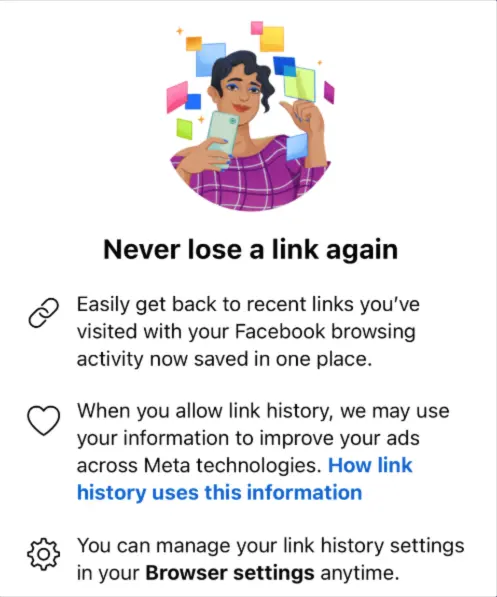- Facebook and Instagram’s new “link history” feature, aimed at helping users track visited links, also enhances Meta’s targeted advertising by using browsing data.
- Users can easily opt out of this feature, but concerns remain about privacy as deactivating link history does not fully prevent Meta from tracking online activities.
In a recent development, Facebook and Instagram have introduced a new feature known as “link history,” which is raising eyebrows among privacy advocates. This feature, as explained by Meta, aims to provide users with the convenience of tracking and revisiting links they have accessed through the in-app browsers of both platforms.
Meta promotes the link history feature as a tool to ensure users “never lose” a link, consolidating the browsing activity within the app. An in-app notification describes this feature as a way to easily access recent links visited. However, this new addition is not just for user convenience.

Implications for targeted advertising
As reported by Gizmodo, the introduction of link history serves a dual purpose. It is a strategic move by Meta to refine its targeted advertising capabilities, especially following the stringent app tracking regulations introduced by Apple. Meta has acknowledged in a support article that the link history information from Facebook’s mobile browser could be utilized to enhance ads across its platforms.
User discovery and privacy concerns
Though initially rolled out last summer, many users are just now becoming aware of these settings. The feature, while not enabled by default, can be easily activated, often without much consideration by the user. This ease of activation, coupled with the way Meta markets the feature, raises concerns among privacy advocates. They argue that Meta is adopting increasingly subtle methods to gather data on users’ online behaviors.
The proposed use should be opt-in and not opt-out and should apply irrespective of how you access Facebook. Having said opt-in, it’s unclear how individuals could really understand and consent to the full use of their data across Meta companies and associated advertising business activities.
Pat Walshe, data protection expert.
Opting out and its aftermath
For users concerned about their privacy, opting out of link history is straightforward. On Facebook, this can be done by accessing the settings from the in-app browser and toggling off the “link history” option. A similar process applies to Instagram. However, even after deactivation, Meta has stated that it could take up to 90 days to fully delete the existing link history, implying that past browsing activities may continue to influence targeted ads for a period.
Also read: Ego-Exo4D: Meta’s new video dataset is going to change video creation forever
Broader context of online privacy
It’s important to note that disabling the link history feature does not completely prevent Meta from tracking online activities. The company employs various other methods for data collection. In a notable development, users in the European Union have been offered an alternative – the option to opt out of Facebook and Instagram ads entirely, albeit at a significant monthly fee.While the link history feature offers convenience, it also underscores the ongoing tension between user convenience and privacy. As digital platforms continue to evolve, the debate around user data and privacy is likely to remain a critical topic of discussion.

